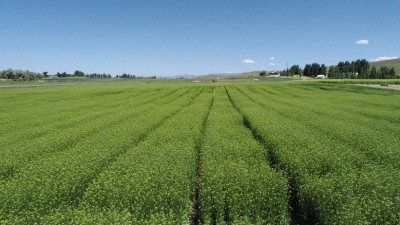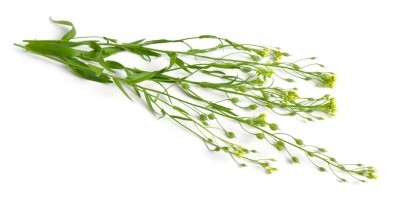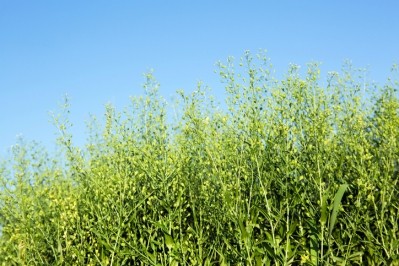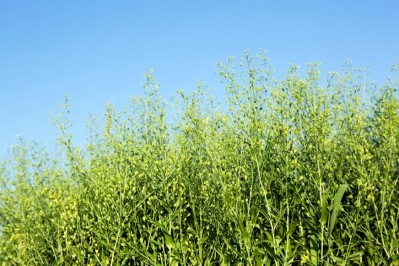Yield10 camelina cultivation program on track: Target markets include biofuels, aquaculture and PHA bioplastics

The findings demonstrate tolerance to the application of an over-the-top herbicide for weed control, said the Massachusetts headquartered company.
Yield10 is using its differentiated trait gene discovery platform to develop improved Camelina varieties to produce proprietary seed products, and to discover high value genetic traits for the agriculture and food industries.
Camelina seed can be used to produce a low-carbon oil for renewable diesel, along with omega-3 oils for aquaculture and nutraceuticals, and PHA bioplastics for use as a biodegradable zero waste packaging solution. The co-product from producing these seed products is Camelina meal which has a protein content of over 40% and can be used in a range of animal feed applications, said the innovator.
It is currently executing a program to develop and commercialize spring and winter Camelina varieties with stacked herbicide traits to achieve large acreage adoption of the crop in North America.
The program gives farmers located in the US and Canada the opportunity to work with genetically modified Camelina as a revenue generating cover crop. With herbicide tolerant plants, farmers can implement weed management practices that have improved yield and profitability while protecting the environment.
“Based on the positive field test results we have reported over the last year, we remain on track with our plan to launch our first commercial HT Camelina varieties in 2025 and following soon thereafter with stacked HT Camelina varieties,” said Yield10 CEO, Dr Oliver Peoples.
He told FeedNavigator that growers are showing significant interest in the program:
“The enrollment program for planting winter Camelina this fall is progressing well. Yield10 offers spring and true winter varieties ideal for crop rotations and as cover crops. When it is used as a cover crop, Camelina has the potential to help reduce soil erosion, improve soil quality, and reduce nutrient run-off. Farmers are offered offtake production contracts for winter Camelina through the enrollment program with net returns similar to canola.
“Our company is also utilizing genome editing and GM techniques to enhance the performance of Camelina; in response to growing interest, we are progressing GM varieties with herbicide tolerance through our development pipeline. In addition, we have gene traits to increase the seed yield and oil content by modifying the genes of Camelina with either GM or gene editing approaches. Farmers and growers have been receptive to gene modifications in crops, especially in managing weeds and pests.”
He said the positive results in the first field test of stacked herbicide tolerance traits represent a key advancement for supporting grower adoption: “Farmers can implement weed management practices with herbicide-tolerant plants that have improved yield and profitability while protecting the environment. In our research so far, we learned that Camelina lines deployed with stacked HT traits intended to provide the plants with a tolerance to the application of an over-the-top broadleaf herbicide for weed control and tolerance to soil residues. Based on these positive field trial results, we remain firmly on track to executing our program to develop and commercialize stacked herbicide-tolerant spring and winter Camelina varieties.”
In the 2022/2023 season, Yield10 planted around 1,000 acres of winter Camelina, which has been or is currently being harvested. “In addition, we secured the target production acres for planting spring 2023 but did not disclose the number of acres; the spring acres will be harvested in the next several weeks. The winter Camelina fields planted last fall have been a great selling point to growers because they have been able to visit those sites and talk with our growers. We believe this is going to be helpful in enabling us to secure contracts with growers for planting our target acres of winter Camelina this fall,” continued the CEO.
Low-carbon intensity biofuel feedstock
The firm expects future grower contracts to cover Camelina grain production for large-scale grain processing to supply low-carbon intensity feedstock oil for the biofuel market and high-protein meal for the animal feed market.
Yield10, said Dr Peoples, has experienced significant interest from the transportation market and it has established a partnership with an [unidentified] biofuel producer for offtake of its Camelina grain.
“We have also signed a memorandum of understanding (MOU) with Mitsubishi and American Airlines and [we have secured] a letter of intent (LOI) with Marathon Petroleum to develop Camelina as a biofuel and sustainable aviation fuel feedstock oil.
“Our strategy is to form a network of alliances within the industry to develop Camelina for the biofuel market.”
Advancements in Camelina varieties, seed operations capabilities, grower network and supply chain developed for biofuels and underwritten by biofuel partnerships will position Yield10 for the subsequent launch of its second Camelina seed product, omega-3 oils, and in the future, PHA bioplastics, noted a recent SEC filing.
The company said it is advancing the development of Camelina lines to produce the EPA component of omega-3, conducting field trials and seed scale-up activities, and expects to engage in commercial discussions with potential customers for the high-value specialty oil this year.
Yield10 is also building an intellectual property (IP) portfolio around its crop technologies and traits.
“As of March 31, 2023, we own or hold exclusive rights to 19 patent families, including 15 issued patents and 41 pending patent applications, related to advanced technologies for increasing crop performance and composition traits in oils and PHA bioplastics, in the US and throughout the world.
“As part of our agreement with Rothamsted Research Limited, we have an exclusive option to license two patent families, including six issued patents and four pending applications, including both the original patent filing for the production of EPA, DHA+EPA oil in Camelina and for an improvement patent filed after the agreement was signed. In November 2022, Yield10 and Rothamsted agreed to extend the exclusive option and license agreement until December 31, 2023,” reads the SEC filing.
















